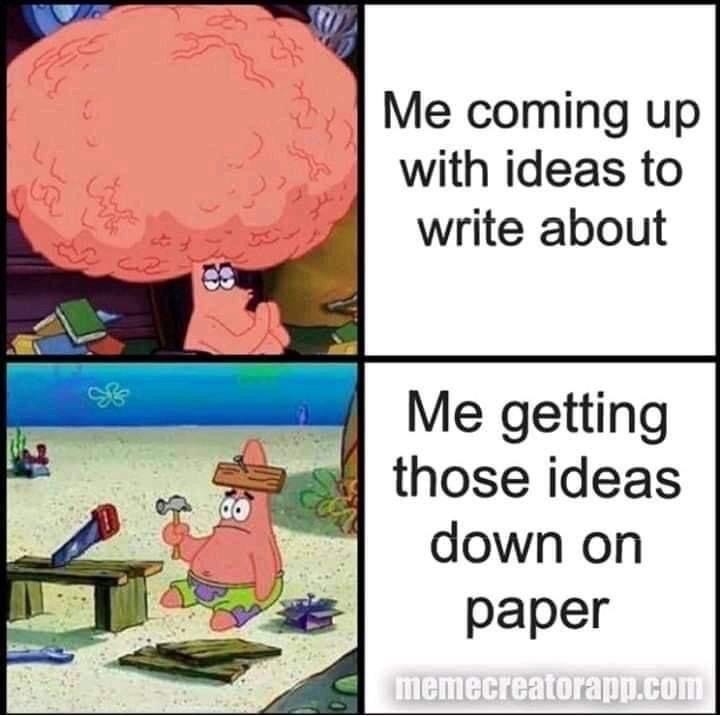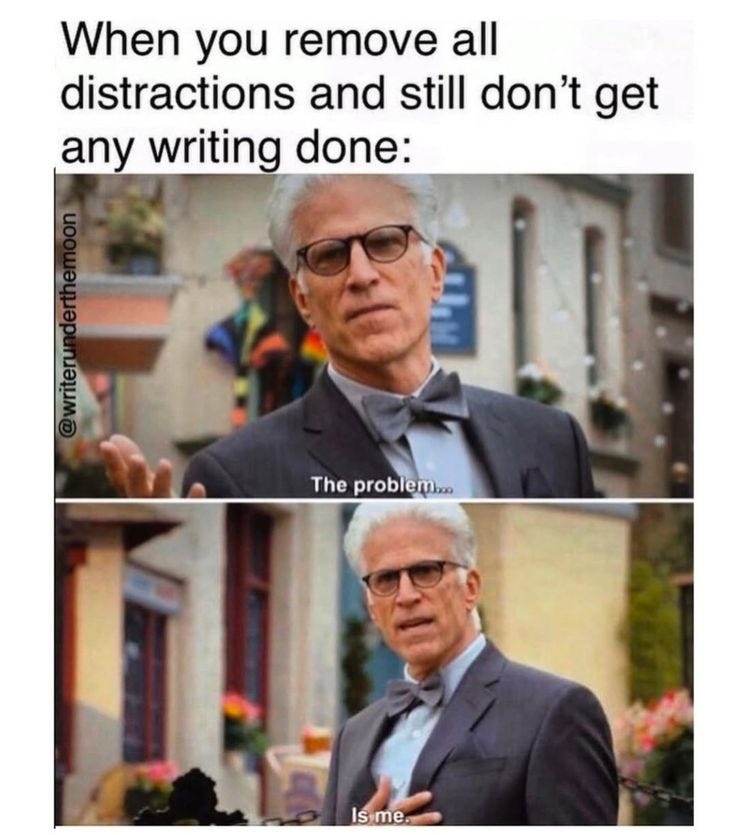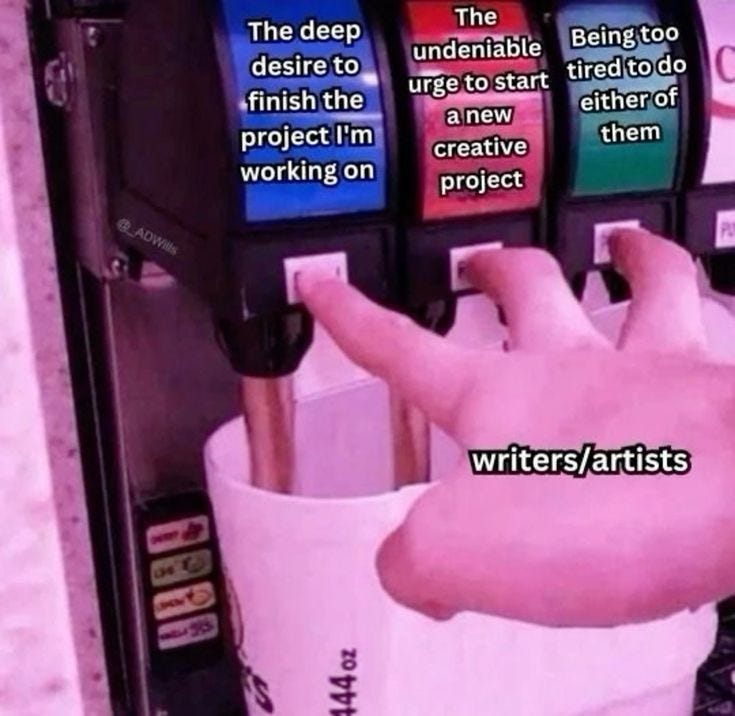How I Trick My Brain Into Writing Essays
A chaotic but honest method for writing nonfiction when executive function has left the chat.
Real, genuine long-form essays take space and time to ferment. I start an essay with real fervor, and months later, realize I either lost the plot or need to let it sit. Sometimes it's because I haven't quite processed/determined where the piece is going, or because I'm not ready to write the rest of it——I haven't lived out enough of my life to know how some pieces end.
This is true of my poetry and fiction too. Most of my stories published in the past few years are ones I've worked on or let sit dormant for decades. To be honest, I find both poetry and fiction easier to write than memoir/nonfiction simply because I can create and build those worlds myself. Unfortunately, as a queer, neurodivergent, disabled, fat, non-monogamous person of color——the world where I live is uninhabitable towards creatures like me (as some people will have you believe.) As I put more energy into my creative pursuits,my process is shifting to accommodate and adjust to my needs.
I thought I'd document it for you so you can see where I might falter or lose myself.
Start with a topic dump
I write everything I find myself curious about on a piece of paper or in my journal. I'll start listing a bunch of questions, or topics, or even write about things I've read or feelings I've been having lately. I do this for around 3-5 minutes and let my brain drain itself of any of the questions and topics it needs. After the alotted time, I'll read what made it on the page. Doing this helps me discern common threads, seeing if some of these topics overlap and be covered by a singular thesis/statement/question, and helps me settle on what the piece should be about.
Brain dump everything you know about the topic
Once I've settled on my topic, I end up crafting a thesis or a statement around it. I then write all the questions, comments, and resources I have on the topic. I write as much as I can: what fascinates me about this topic? Why am I writing it now? What is compelling me to research more about this? Essentially, this brain dump is a pitch to myself on why I'm interested in this topic, why I should write it now and what makes it so timely. I try to do this for another 5-10 minutes, or until I feel like I’ve been sufficiently productive enough to work with the material.
Research
If I can’t think of anything to fill a page for 5-10 minutes, I’ll distract myself midway and start perusing the internet. For many writers, research is necessary. However, this early, I use research as a procrastination tool. If the topic is academic enough, I’ll hop onto Google Scholar or JSTOR (if you have access to more libraries or academic databases than this, utilize those. It’s way faster/easier)
Outline first, then draft
I used to be a pants-er, seeing where my pen takes me. However, as I develop a steady writing practice, I realize I can’t draft anything without outlining at least part of it. I find that I need a solid thesis (something to write towards) or else what’s the point? I flex my outline or mind-map based off that. This is the time to look back at the brain dump and start organizing the piece beat by beat. When I have an outline, I’m able to take the pieces of my brain dump and start organizing them into sections. If I don’t have enough evidence on my own, I’ll return to the research step and disseminate that afterwards.
Draft away
A repeat of step 2, only following an outline and more cohesive thoughts. I try to bang out a quick first draft which should help. This is one of the easiest steps, if I’ve calculated the ways my brain could fail me ahead of time. (ADHD is fun… lol) This is one of the longest steps because sometimes step 2 automatically leads to this step. I try my best to adhere to the outline, and often go BACK to step 3 to create one if steps 2 and 4 mold together. Also, some things just need time to… ferment and find their own shape.
EDIT, EDIT, EDIT! REVISE, REVISE, REVISE!
I used to hate this step.
If I don’t have access to a mentor reading my work, I’ll try to get some of my pieces out into a workshop setting. If that isn’t accessible, I’ll hit up my writing group. Or, if I want to get a draft out quickly but don’t have time to talk to others, I’ll read my work aloud. (Or get a screen-reader to do it for me.) Reading the work aloud helps with editing and revision because I can hear the musicality of the text. As humans, we crave variety and change—and when we write or tell stories, the easiest way to do that is by reading out loud. By being able to hear what the text sounds like, it gives me a clue as to sentence-level and even word-level choices. If I get tired of hearing a phrase, or if something sounds off, I can catch it by having it read aloud. This is by far, the most challenging step of them all.
Become overwhelmed by the revision process. Cry. A lot.
Self explanatory. After receiving an onslaught of feedback, I have to sit with it and see what works. This is when going back to the outline (step 3) is helpful because I can ask myself: Do these suggestions serve my outline/thesis? If it does, I try to edit according to the feedback. If not, I throw it away (but thank the people for their questions and letters. Workshop can be brutal, but it helps point out gaps of knowledge and understanding so I can create a more cohesive piece.)
Send out your work prematurely because of your audacity
My impulsivity (thank you, once again, ADHD) causes me to go full-send (literally) for a piece’s publication. Often, I will send out my piece in its second or third stage of drafting and see if it’s ready. If it doesn’t get accepted, I take that as a sign that I need more revising. (If you like sending to literary publications and don’t mind spending extra money on feedback—take the opportunity, it’s a good way to see what those literary readers or editors thought of your work. If it’s accepted: Great! You have an essay. If it’s not? Go back to step 2-5 and repeat.
Now keep going. Keep doing it until you run out of things to write about!
That’s how I get a piece out. I’m working on an essay about becoming a writer and I’ve been stuck on step 2, which bothers me a little because I have a lot to say—but I’m at a loss for how to express it cohesively. I’ll have to do more thinking (...I’m in two writing workshops and about to go on vacation. Help!) before I return to my messy brain dump about writing but I’m curious: What does your writing process look like? Are you a planner, or do you write through your emotions? Let me know what you think!
As always, thank you for joining me. I hope you’re all enjoying your week!
Warmly,
C
If you enjoyed this, please consider sharing/forwarding this piece to your friends.
If you’re not already subscribed, I’d love if you joined me. I try to send an essay to your inbox once a month, but I am to send out little tidbits every two weeks. I’d love to have you as part of the community!
Lastly, if you’d like to support my livelihood—Substack (as a platform) takes a certain percentage of the profits from the paid tier. If you’d like to help support this unpaid venture and help me sustain myself, you can go to my website instead and contribute there!
On the website, you’ll be able to specify a specific amount to contribute, and you can opt to contribute once, or regularly (on a weekly, monthly, etc. basis.) Those who want to support my work receive my utmost gratitude, and more ways to interact with me. (If you’re interested in peer support services, you’re also able to get on my books, like now, when they’re not open to the general public or returning clients.)







